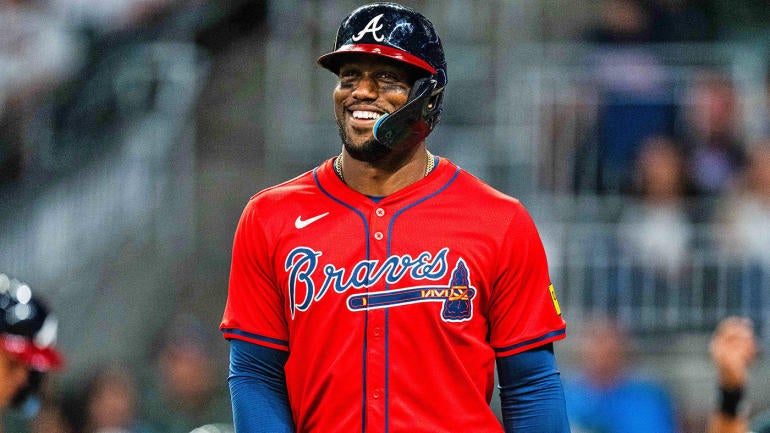Villanova’s Enoch Boakye rises up and puts down a monster jam vs. Colorado
The Villanova Wildcats' Enoch Boakye rose up and put down a monster jam vs. Colorado
 play_arrow
play_arrow
Radio Rehoboth


In case you missed it while celebrating Halloween, the Atlanta Braves and Los Angeles Angels made the first trade of the offseason on Thursday, roughly 14 hours after the completion of the World Series. The Braves sent veteran outfielder/designated hitter Jorge Soler out west in exchange for right-handed starter Griffin Canning.
On its face, this exchange makes for a lopsided challenge trade. Soler is coming off a significantly better season, one that saw him post a 121 OPS+ and launch 21 home runs despite spending half the year with the San Francisco Giants. Canning, for his part, performed at the replacement level, generating an 81 ERA+ in 171 innings.
Braves general manager Alex Anthopoulos has earned a reputation for being baseball’s “first mover.” Every winter, it seems, is ushered in by Anthopoulos doing something: a signing, a trade, an extension. You might look at the Soler-Canning swap and register it as Anthopoulos being in on the bit. Alas, we don’t live in such an idyllic world. Rather, we think there are two main reasons why Anthopoulos acted quickly to make this move.
Scroll with us as we explain.
We established that Soler was more productive than Canning. He’s also more expensive over a longer term. Soler has two years and $26 million remaining on the contract he signed last winter with the Giants. Canning, meanwhile, is entering his final season of arbitration eligibility and is projected to make around $5 million, according to Matt Swartz’s model. If the Braves wanted to, they could non-tender him ahead of the Nov. 22 deadline and pay him zilch, nada, nothing for the duration of his stay.
Essentially, Anthopoulos freed up between $8 and $13 million from the books for 2025, as well as an additional $13 million from his 2026 obligations. With some teams, you would have to add the caveat that they might not spend that money, rendering the financial flexibility worthless. The Braves have reliably fielded a top-10 payroll in recent years, and it’s not hard to envision them making a bold move or two this winter.
How, precisely, that manifests is to be seen. Perhaps they make a run at top free-agent shortstop Willy Adames, or maybe they try to retain star lefty Max Fried. Whatever they do (or don’t do), the savings from moving Soler ought to come in handy.
Again, it’s possible the Braves cut their line on Canning in about three weeks’ time. From the outside, though, we think they might view him as a good buy-low candidate rather than pure financial ballast. That’s in part because the Angels could’ve easily non-tendered him themselves without paying an additional dime. It’s also because the Braves have a history of doing this kind of thing — and doing it well.
Whenever the Braves are talked about as an organization, the focus tends to be on their impressive collection of hitters. They’ve demonstrated, time and again, that they deserve more credit for their ability to analyze and enhance pitchers. Who saw Reynaldo López developing into an All-Star starter in his age-30 season? Not us. Credit it to good coaching, good analytics (the Braves employ Mike Fast, a pioneer in pitch-tracking analysis), or some combination thereof; whatever the catalyst, the outcome is the same: the Braves tend to cash out on their pitching bets.
Canning, 28, might not look like an obvious upside play. He’s posted an ERA+ in the 80s twice in his last three seasons (he missed the entire 2022 campaign), and he’s coming off a miserable year that saw him strike out a personal-worst 6.8 batters per nine innings. Yet you don’t have to look very hard to identify some low-hanging fruit that the Braves — if they do keep him around — could ask him to tweak.
Let’s put it this way: the pitch modeling algorithms consider Canning’s slider to be his best pitch. It may surprise you, then, to learn that the slider had the third-highest usage rate in his arsenal, including behind a fastball that graded as his worst offering. “Throw your best pitch more often” has served as an easy fix for some pitchers before; there’s no apparent reason why it can’t work in a case like Canning’s.
Of course, the Braves may see chicken on the bone on a more granular level. Maybe they want Canning to experiment with his sinker, or attempt to throw a sweeper, or any other number of changes, be it mechanical or strategical. We’re just pointing out that if you wanted to employ One Simple Trick to make Canning more effective, increasing his slider usage stands out.
It’s possible, too, that we’re wrong about the Braves’ intent with Canning. Come Nov. 22, perhaps they free him and gleefully count their savings. Fair enough. Just know that there’s a clear motivation at play here beyond Anthopoulos wanting to be first in line.
Go to Source
Author: R.J. Anderson
Written by: RSS
The Villanova Wildcats' Enoch Boakye rose up and put down a monster jam vs. Colorado
Check out the best moments between the Oregon State Beavers and the UCF Knights in The Crown.


Copyright 2023 East Sussex Public Broadcasting, Inc.